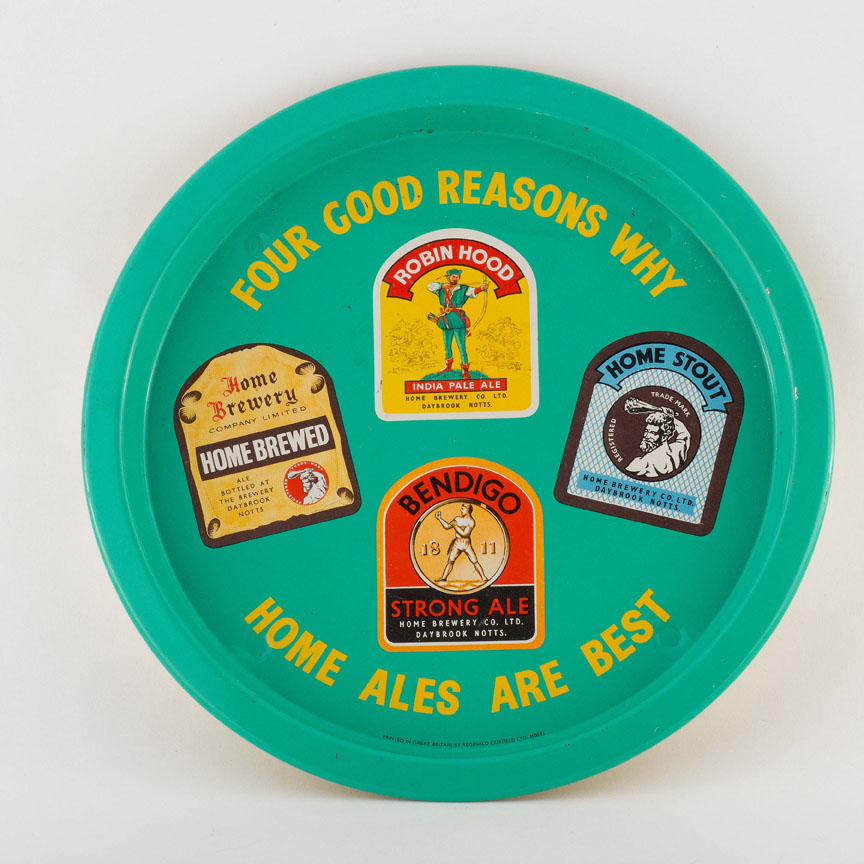Home Brewery Co. Ltd Small Round Tin
Home Brewery Co. Ltd tin tray dating from the 1960s.
The Home Brewery was based in Daybrook, near Nottingham, Nottinghamshire.
In Collection
Home Brewery Co. Ltd tin tray dating from the 1960s.
The Origins of the Robinson Brewery Business
Thomas Robinson was a farmer from Arnold, near Nottingham, who also owned a malting business.
When he died, his youngest son John Robinson, took over the the malting business, and half of the farm.
After also running a laundry business, John Robinson purchased land on Mansfield Road in Daybrook, and there he built a brewery and maltings, in 1875.
He named it the Home Brewery after his own Home Farm in Bestwood.
From 1878 the business traded as John Robinson, and soon after that he started to purchase his own public houses.
In 1880, construction started on a large, steam-powered brewery, that would produce a range of beers, including Family Pale Ale, Dinner Ale, Prime Inavlid Stout, and a non-alcoholic Empire Stout.
Home Brewery Co. Ltd Registered in 1890
The Company was registered as Home Brewery Co. Ltd in 1890, to acquire John Robinson's business, which had been recently registered as John Robinson's Brewery Ltd.
At the time of registration, the Company owned 61 public houses, and during the next twelve years, a further 87 houses were acquired.
When John Robinson's son, John Sandford Robinson, joined the firm in 1890, a strong commemorative ale was brewed, named 'Johnny Robinson's Strike-me-Dead'. Ironically, his son died in 1898.
By 1912, John Robinson had virtually retired from the business, which now had a new managing director, John Thomas Farr.
In 1914, the Home Brewery Co. Ltd purchased Hutchinson's Prince of Wales Brewery, with 16 public houses, based in Old Basford.
It was John Thomas Farr who guided the firm through the difficult First World War years.
John Thomas Farr's nephew, Captain John Farr, who had joined the Company in 1919, became its chairman when John Robinson died in 1929.
In 1921 Home Brewery Co. Ltd purchased George Green's small brewing business on Howard Street, in Nottingham. The acquisition included 18 public houses, three of which, the Royal Children, Newcastle arms, and Sir Isaac Newton, were home-brew pubs.
Rapid Expansion and a New Modern Brewery
The rapid progress in pub acquisitions continued when another 81 public houses were added to its estate between 1920 and 1927.
In addition, a new soft drinks plant was added in 1925.
The Company's Hercules trade mark, displaying a muscular arm, was registered in 1926.
Designed by architect Cecil Howitt, a complete reconstruction of the original brewery was started in 1938.
Although it was almost completed in 1939, its full occupancy was interrupted by the Second World War.
In 1952 the office tower was added, and three major extensions increased the firm's brewing capacity.
Approximately 100 public houses were either built or purchased during the 1960s and 1970s, and the Company's free trade sales increased by 350% in the same period.
By the late 1960s a new Robin Hood trade mark had replaced Hercules. Another trade mark, Bendigo, the bare knuckle boxer, also first appeared during the 1960s.
A new bottling hall was erected in 1968, and a new brewhouse was completed in 1974.
In 1978 Home celebrated its centenary, announcing plans to build a new modern brewery with the potential to brew a million barrels a year. This was completed in 1986.
By the mid-1980s the Company was supplying 400 outlets.
The business was the perfect target for a large national brewer.
The Scottish & Newcastle Breweries Ltd Takeover
The Company remained independent until 1986 when the brewery. with 447 public houses, was acquired by Scottish & Newcastle Breweries Ltd.
Scottish & Newcastle Breweries Ltd gradually ran down production by subcontracting brewing to the Mansfield Brewery Co. Ltd, resulting in the closure of the Daybrook brewery by Scottish Courage Ltd in 1996.
Most of the buildings were demolished and the achievements of a once great brewery were virtually obliterated.
The few buildings that did survive were officially named 'Sir John Robinson House', and consist of council offices and housing.
The manufacturer's mark states - Printed in Great Britain by Reginald Corfield Ltd. M0093
Additional information
| Tray Manufacturer | Reginald Corfield Ltd (Redhill) |
|---|---|
| Tray Material | Tin |
| Year Of Manufacture | 1967 |
| Brewery Origin | England |
| County | Nottinghamshire |
| Reverse Finish | Standard |
| Stock Location | Box 33 |
| Tray Shape | Round – Small |



Reviews
There are no reviews yet.